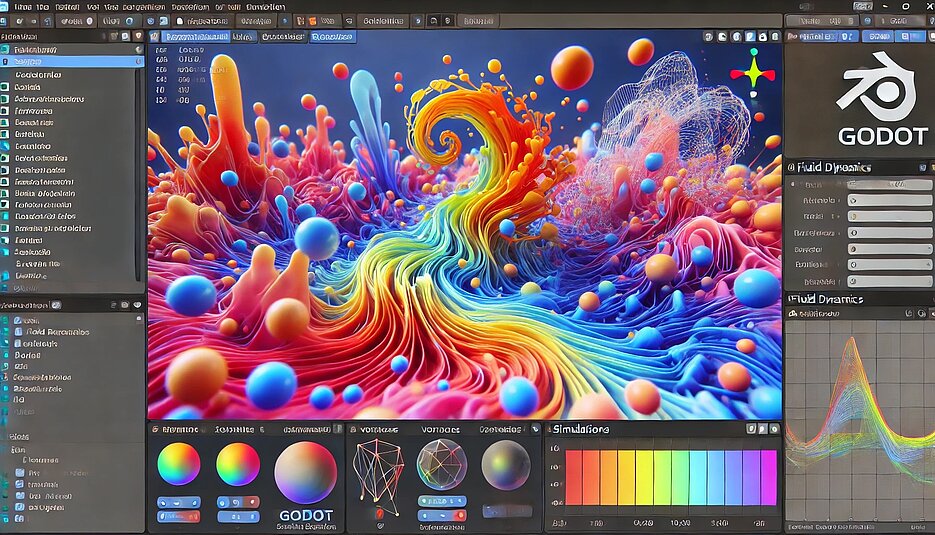GPU-based Smoothed Particle Hydrodynamics (SPH) with SYCL
10.03.2025GPU-based fluid dynamics without vendor lock-in is the foundation for its broad use in games. Here we go...!
We offer a series of Bachelor thesis projects in the area of interactive simulations, focusing on efficient GPU-based fluid dynamics using Smoothed Particle Hydrodynamics (SPH). Each thesis is structured according to scientific best practices, encompassing literature research, methodical implementation, evaluation, and documentation.
The proposed projects can be addressed independently. However, certain projects naturally complement one another. We distinguish between:
- Fully independent projects, which can be approached separately without prior work.
- Soft-dependent projects, where outcomes from foundational projects provide significant advantages, yet can be completed with simplified reference implementations.
Fully Independent Projects
Project 1: Design and Implementation of a SYCL-based Particle Simulation Framework
Goal:
Develop and evaluate a foundational particle simulation framework utilizing SYCL for efficient GPU-based computations.
Tasks include:
- Literature review of particle simulations and GPU computing
- Development of basic particle data structures and integration kernels
- Benchmarking performance on CPU and GPU backends
This project serves as a strong basis for subsequent topics but is fully self-contained.
Project 2: Efficient Neighbor Search Methods for GPU-based SPH Simulations with SYCL
Goal:
Implement and benchmark GPU-accelerated neighbor search algorithms using spatial hashing or uniform grids suitable for SPH simulations.
Tasks include:
- Literature review of spatial partitioning methods on GPUs
- Development and evaluation of neighbor search structures in SYCL
- Scalability benchmarking and performance evaluation
This project is independent but lays groundwork beneficial for Project 5.
Project 3: Numerical Implementation and Validation of SPH Kernels with SYCL
Goal:
Implement standard SPH kernels (density, pressure, viscosity) and perform rigorous numerical validation against established benchmarks.
Tasks include:
- Literature survey on SPH numerical kernels and validation methods
- Implementation and validation of SPH kernels using SYCL
- Conduct convergence and sensitivity studies
This topic can be executed independently, though prior implementation from Project 1 would ease initial setup.
Project 6: Interactive Real-time Visualization of GPU-based SPH Simulations using SYCL and Vulkan/OpenGL
Goal:
Develop an interactive real-time visualization pipeline for particle data, investigating SYCL-GPU graphics API interoperability.
Tasks include:
- Literature research on GPU interoperability techniques (SYCL/Vulkan/OpenGL)
- Real-time visualization implementation for particle systems
- Evaluation of visualization performance and interactivity
Independent project; can utilize synthetic or externally provided particle data.
Project 7: Scientific Application and Validation of GPU-based SPH Simulations
Goal:
Apply GPU-based SPH simulation to realistic scientific scenarios, validating the results scientifically.
Tasks include:
- Literature and benchmark analysis for validation scenarios (e.g., dam break, fluid-structure interaction)
- Implementation and execution of scientifically relevant simulation scenarios
- Validation against analytical, experimental, or existing numerical results
Independent project; suitable for direct application using simplified SPH solver or reference implementations.
Soft-dependent Projects (with recommended prior projects)
Project 4: Performance Optimization and Cross-platform Analysis of SYCL-based SPH Kernels
Goal:
Analyze, optimize, and benchmark SYCL kernels across different GPU platforms (Intel, NVIDIA, AMD), identifying vendor-specific performance differences.
Tasks include:
- Kernel profiling across multiple GPU architectures
- Backend-specific parameter tuning for optimized performance
- Empirical performance evaluation and comparative analysis
This project benefits substantially from prior completion of Project 1 or 3, but simplified reference kernels can also be used as a starting point.
Project 5: Advanced GPU-based Spatial Data Structures for Neighbor Searches in SPH Simulations
Goal:
Implement advanced GPU spatial partitioning strategies (radix sort, Morton encoding) to significantly improve SPH simulation efficiency.
Tasks include:
- Advanced literature research on GPU-based neighbor search methods
- Implementation and integration of sophisticated spatial indexing techniques
- Performance evaluation and scalability analysis
This project naturally builds upon Project 2, although re-implementation of simple neighbor searches remains possible.
Project 8 (Advanced): Numerical Stability Analysis and Parameter Optimization in GPU-based SPH Simulations
Goal:
Investigate numerical stability and the sensitivity of SPH parameters, deriving practical optimization guidelines.
Tasks include:
- Literature study of numerical stability and SPH parameter influence
- Implementation of an automated stability testing framework
- Statistical analysis to determine optimal SPH parameters
Recommended as an advanced continuation project; prior completion of Project 1 or 3 is advantageous but not strictly required.
Requirements:
- Solid knowledge of C++ programming
- Interest in GPU computing and interactive physical simulations
- Independent, structured working methodology
Supervisor:
Prof. Dr. Sebastian von Mammen







